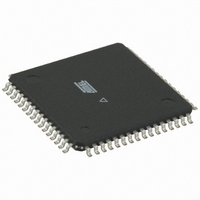ATMEGA649A-AU Atmel, ATMEGA649A-AU Datasheet - Page 246

ATMEGA649A-AU
Manufacturer Part Number
ATMEGA649A-AU
Description
IC MCU AVR 64K FLASH 64TQFP
Manufacturer
Atmel
Series
AVR® ATmegar
Specifications of ATMEGA649A-AU
Core Processor
AVR
Core Size
8-Bit
Speed
16MHz
Connectivity
SPI, UART/USART, USI
Peripherals
Brown-out Detect/Reset, LCD, POR, PWM, WDT
Number Of I /o
54
Program Memory Size
64KB (32K x 16)
Program Memory Type
FLASH
Eeprom Size
2K x 8
Ram Size
4K x 8
Voltage - Supply (vcc/vdd)
1.8 V ~ 5.5 V
Data Converters
A/D 8x10b
Oscillator Type
Internal
Operating Temperature
-40°C ~ 85°C
Package / Case
64-TQFP
Processor Series
ATmega
Core
AVR
Data Bus Width
8 bit
Data Ram Size
4 KB
Interface Type
SPI, USART
Maximum Clock Frequency
16 MHz
Number Of Programmable I/os
54
Number Of Timers
3
Operating Supply Voltage
3.3 V
Maximum Operating Temperature
+ 85 C
Mounting Style
SMD/SMT
Minimum Operating Temperature
- 40 C
Operating Temperature Range
- 40 C to + 85 C
Lead Free Status / RoHS Status
Lead free / RoHS Compliant
Available stocks
Company
Part Number
Manufacturer
Quantity
Price
- Current page: 246 of 712
- Download datasheet (41Mb)
23.4.2
23.4.3
8284A–AVR–10/10
Updating the LCD
Disabling the LCD
Display memory (LCDDR0, LCDDR1,...), LCD Blanking (LCDBL), Low power waveform
(LCDAB) and contrast control (LCDCCR) are latched prior to every new frame. There are no
restrictions on writing these LCD Register locations, but an LCD data update may be split
between two frames if data are latched while an update is in progress. To avoid this, an interrupt
routine can be used to update Display memory, LCD Blanking, Low power waveform, and con-
trast control, just after data are latched.
In the example below we assume SEG10 and COM1 and SEG4 in COM0 are the only segments
changed from frame to frame. Data are stored in r20 and r21 for simplicity
Note:
In some application it may be necessary to disable the LCD. This is the case if the MCU enters
Power-down mode where no clock source is present.
The LCD should be completely discharged before being disabled. No DC voltage should be left
across any segment. The best way to achieve this is to use the LCD Blanking feature that drives
all segment pins and common pins to GND.
When the LCD is disabled, port function is activated again. Therefore, the user must check that
port pins connected to a LCD terminal are either tri-state or output low (sink).
Assembly Code Example
C Code Example
ATmega169A/169PA/329A/329PA/649A/649P/3290A/3290PA/6490A/6490P
LCD_update:
Void LCD_update(unsigned char data1, data2);
{
}
; LCD Blanking and Low power waveform are unchanged.
; Update Display memory.
sts
sts
ret
/* LCD Blanking and Low power waveform are unchanged. */
/* Update Display memory. */
LCDDR0 = data1;
LCDDR6 = data2;
1.
See ”About Code Examples” on page 11.
LCDDR0, r20
LCDDR6, r21
(1)
(1)
246
Related parts for ATMEGA649A-AU
Image
Part Number
Description
Manufacturer
Datasheet
Request
R

Part Number:
Description:
Manufacturer:
Atmel Corporation
Datasheet:

Part Number:
Description:
Manufacturer:
ATMEL Corporation
Datasheet:

Part Number:
Description:
Manufacturer:
ATMEL Corporation
Datasheet:

Part Number:
Description:
IC AVR MCU 64K 16MHZ 5V 64TQFP
Manufacturer:
Atmel
Datasheet:

Part Number:
Description:
IC AVR MCU 64K 16MHZ 5V 64-QFN
Manufacturer:
Atmel
Datasheet:

Part Number:
Description:
IC AVR MCU 64K 16MHZ COM 64-TQFP
Manufacturer:
Atmel
Datasheet:

Part Number:
Description:
IC AVR MCU 64K 16MHZ IND 64-TQFP
Manufacturer:
Atmel
Datasheet:

Part Number:
Description:
IC AVR MCU 64K 16MHZ COM 64-QFN
Manufacturer:
Atmel
Datasheet:

Part Number:
Description:
MCU AVR 64KB FLASH 16MHZ 64TQFP
Manufacturer:
Atmel
Datasheet:

Part Number:
Description:
MCU AVR 64KB FLASH 16MHZ 64QFN
Manufacturer:
Atmel
Datasheet:

Part Number:
Description:
IC AVR MCU 64K 16MHZ IND 64-QFN
Manufacturer:
Atmel
Datasheet:

Part Number:
Description:
IC MCU AVR 64K 5V 16MHZ 64-TQFP
Manufacturer:
Atmel
Datasheet:

Part Number:
Description:
IC MCU AVR 64K 5V 16MHZ 64-QFN
Manufacturer:
Atmel
Datasheet:

Part Number:
Description:
MCU 8-Bit ATmega AVR RISC 64KB Flash 5V 64-Pin TQFP T/R
Manufacturer:
Atmel
Datasheet:











